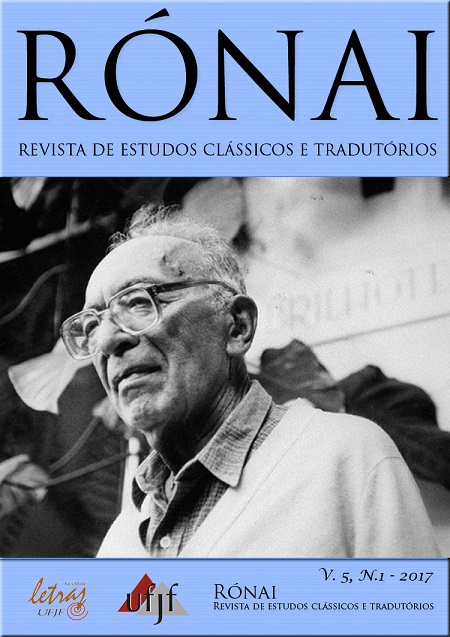Intertextualidade e o cânone retórico
DOI:
https://doi.org/10.34019/2318-3446.2017.v5.23208Palabras clave:
Arte literária, crítica, intertextualidade, cânone, retóricaResumen
Este artigo parte de uma história etimológica dos termos "retórica" e "cânone" para abordar a interdependência de métodos e meios entre a arte literária (produção e crítica) e o tradicional sistema retórico que esteve na base da educação europeia desde a Antiguidade. A intertextualidade é reconhecida como uma "constante literária universal", e são apontados os modos pelos quais o ensino formal teve um papel central na validação do cânone literário na Idade Média e no Renascimento. Ao final, apontam-se caminhos para avaliar, decodificar e relativizar a tradição retórica no contexto da crítica moderna, ressaltando que o processo de desconstrução não deve implicar o desmantelamento das estruturas, mas uma consciente manifestação de cada uma delas.
Descargas
Citas
BALDWIN, T. W. William Shakespeare's Small Latine and Lesse Greeke. Urbana: University of Illinois Press, 1944. 2 v.
BARON, H. Humanistic and Political Literature in Florence and Venice at the Beginning of the Quattrocento. Cambridge: Harvard University Press, 1955a.
______. The Crisis of the Early Italian Renaissance: Civic Humanism and Republican Liberty in an Age of Classicism and Tyrany. Princeton: Princeton University Press, 1955b. 2 v.
BATE, W. J. The Burden of the Past and the English Poet. Cambridge: Belknap Press, 1970.
BUSH, D. Mythology and the Renaissance Tradition in English Poetry. Minneapolis: University of Minnesota Press, 1932.
ELYOT, S. T. The Book Named The Governor. Londres: Dent, 1907.
ERASMO. The Collected Works of Erasmo. Toronto: University of Toronto Press, 1974.
FUMAROLI, M. L’Âge de l'éloquence : Rhetorique et 'res literaria' de la Renaissance au seuil de l'époque classique. Geneva: Droz, 1980.
GORDAN, P. W. G. Pro Renaissance Book Hunters: The Letters of Poggius Bracciolini to Nicolaus de Niccolis. New York: Columbia University Press, 1974.
GREENE, T. M. The Light in Troy: Imitation and Discovery in Renaissance Poetry. New Haven: Yale University Press, 1982.
HENDERSON, J. R. Erasmus on the Art of Letter Writing. In: MURPHY, J. J. (Org.). Renaissance Eloquence: Studies in Theory and Practice of Renaissance Rhetoric. Berkeley: University of California Press, 1983.
HOFSTADTER, D. R. Godel, Escher, Bach: An Eternal Golden Braid New York: Vintage Book, 1979.
JUNG, C. G.; KERÉNYI, K. Essays on a Science of Mythology. New York: Pantheon, 1948, passim — com referências fornecidas por eles.
KENNEDY, G. A. Classical Rhetoric and Its Christian and Secular Tradition from Ancient to Modern Times. Chapel Hill: University of North Carolina Press, 1980.
KERMODE, F. The Genesis of Secrecy. Cambridge: Harvard University Press, 1976.
KLEIN, R. In: Formand Meaning: Essays on the Renaissance and Modern Art.. New York: Viking Press, 1979.
KRISTELLER, P. O. Renaissance Thought and Its Sources. New York: Columbia University Press, 1979.
LARUSSO, D. A. Rhetoric in the Italian Renaissance. In: MURPHY, J. J. Renaissance Eloquence: Studies in the Theory and Practice of Renaissance Rhetoric. Berkeley: University of California Press, 1983.
MAN, P. de. Blindness and Insight: Essays in the Rhetoric of Contemporary Criticism. New York: Oxford University Press, 1971.
MCFARLAND, T. Literature and Philosophy. In: BARRICELLI, J.-P. (Org.). Interrelations of Literature. New York: Modern Language Association of America, 1982.
MILLER, J. H. Stevens' Rock and Criticism as Cure, II. Georgia Review, v. 30, 1976.
MOSS, J. (Org.) Rhetoric and Praxis. New York: Catholic University of America Press, 1986.
MURPHY, J. J. Renaissance Rhetoric: A Short-Title Catalogue. New York: Garland, 1981.
_______. Renaissance Eloquence: Studies in the Theory and Practice of Renaissance Rhetoric. Berkeley: University of California Press, 1983.
POCOCK, J. G. A. Politics, Language, and Time. New York: Atheneum, 1971.
SCHANZ, H. Problems and Trends in the History or German Rhetoric to 1500. In: MURPHY, J. J. Renaissance Eloquence: Studies in the Theory and Practice of Renaissance Rhetoric. Berkeley: University of Calilfornia Press, 1983.
SCHOECK, R. J. On Rhetoric in Fourteenth-Century Oxford. Medieval Studies, Toronto, v. 30, 1968.
______. The Achievement of Thomas More. Victoria: University of Victoria, 1976.
______. Review of Murphy’s Renaissance Rhetoric: A Short-Title Catalogue, in English Language Notes, v. 21, 1981.
VICKERS, B. (Org.). Rhetoric Revalued: Papers from the International Society for the History of Rhetoric. Medieval and Renaissance Texts and Studies, Arizona: Arizona State University, 1982.
______. Lighting a Candle to the Place: On the Dimensions and Implications of Imitatio in the Renaissance. Italian Culture, Abingdon, v. 4, 1983.
______. Modern European Intellectual History. Denver Quarterly Review, Denver, v. 19, 1984.
VINSAUF, G. de. Poetria Nova. Trad. Margaret Nims. Toronto: Pontifical Institute of Mediaeval Studies, 1967, p. 16-17.
WILLIAMS, R. Keywords: A Vocabulary of Culture and Society. New York: Oxford University Press, 1976.
Descargas
Publicado
Cómo citar
Número
Sección
Licencia
Derechos de autor 2017 Richard Joseph Schoeck

Esta obra está bajo una licencia internacional Creative Commons Atribución 4.0.
Derechos de autor
Los autores que publican en esta revista aceptan los siguientes términos:
1. Los autores y las autoras conservan los derechos de autor y le otorgan a la revista el derecho a la primera publicación, que está bajo la licencia Creative Commons Attribution License 4.0 Internacional.
2. Los autores y las autoras pueden publicar y compartir el trabajo con reconocimiento de la publicación inicial en esta revista.
3. Los autores y las autoras de las obras aprobadas autorizan a la revista a asignar el contenido de sus obras, después de la publicación, para su reproducción en indexadores de contenido, bibliotecas virtuales y similares.
Para obtener más información sobre Creative Commons Attribution License 4.0 Internacional, acceda a: https://creativecommons.org/licenses/by/4.0/deed.es
Exención editorial
El contenido de los artículos publicados es responsabilidad única y exclusiva de sus autores, y no representa la posición oficial de Rónai - Revista de Estudos Clássicos e Tradutórios o de la Faculdade de Letras de la Universidad Federal de Juiz de Fora o instituciones asociadas.



